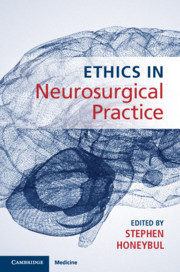Book contents
- Ethics in Neurosurgical Practice
- Ethics in Neurosurgical Practice
- Copyright page
- Contents
- Contributors
- Introduction
- Part I General Ethics
- Chapter 1 Introduction to Ethics and Ethical Theory
- Chapter 2 Models and Methods in Ethics
- Chapter 3 The Concept and Implementation of Values-Based Medicine (VsBM) in Neurosurgery
- Chapter 4 The Three Functions of Consent in Neurosurgery
- Chapter 5 Withholding and Withdrawing Medical Treatment: Legal, Ethical, and Practical Considerations
- Chapter 6 Surgical Training
- Chapter 7 The Aging Surgeon
- Chapter 8 Healthcare Economics
- Chapter 9 Patient Data, Ownership, Storage, and Social Media
- Part II Neurosurgery-Specific Bioethics
- Part III Future Developments
- Index
- References
Chapter 7 - The Aging Surgeon
from Part I - General Ethics
Published online by Cambridge University Press: 29 May 2020
- Ethics in Neurosurgical Practice
- Ethics in Neurosurgical Practice
- Copyright page
- Contents
- Contributors
- Introduction
- Part I General Ethics
- Chapter 1 Introduction to Ethics and Ethical Theory
- Chapter 2 Models and Methods in Ethics
- Chapter 3 The Concept and Implementation of Values-Based Medicine (VsBM) in Neurosurgery
- Chapter 4 The Three Functions of Consent in Neurosurgery
- Chapter 5 Withholding and Withdrawing Medical Treatment: Legal, Ethical, and Practical Considerations
- Chapter 6 Surgical Training
- Chapter 7 The Aging Surgeon
- Chapter 8 Healthcare Economics
- Chapter 9 Patient Data, Ownership, Storage, and Social Media
- Part II Neurosurgery-Specific Bioethics
- Part III Future Developments
- Index
- References
Summary
Over the past two hundred years the average global life expectancy has increased from just over thirty years of age to well over seventy years of age. There are many reasons for this ranging from the eradication of certain diseases, life style changes and improvements in public health. As people have lived longer, so they have worked longer, and this is reflected in the changing demographic of the workforce. However, notwithstanding this increase in life expectancy the aging process can takes in toll in terms of cognitive and functional decline which may have an impact on the ability of the older person to perform satisfactorily in the workplace. Where this involves physicians and surgeons there is obvious concern for patient safety.
- Type
- Chapter
- Information
- Ethics in Neurosurgical Practice , pp. 64 - 72Publisher: Cambridge University PressPrint publication year: 2020



